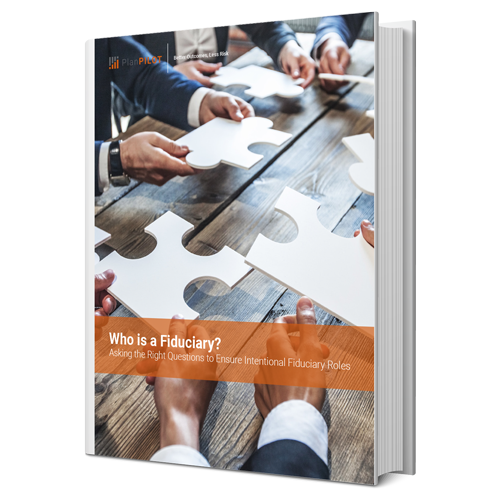A retirement plan consultant plays an important role in your business, helping you follow fiduciary responsibilities, mitigate risk, and provide an appropriate plan based on cost parameters and employee needs. Businesses rely on consultants to provide objective and knowledgeable guidance, advice, and service.
The extent of services provided by retirement plan consultants can vary significantly; therefore, in searching for an advisor, it is best for you to look for the services most optimal for your plan’s specific needs.
Key Areas of Service
Generally speaking, there are five key areas of service that a consultant should be able to provide:
- Plan Governance Consulting: assistance and education in the area of establishing and maintaining a Plan Committee, and developing the roles and responsibilities of each committee member.
- Plan Design Consulting: assistance in determining IF the plan is meeting the plan sponsor’s needs and goals, and if not, what can be done to “improve” the plan’s performance.
- Education Consulting / Assistance: assistance in determining the effectiveness of current employee communications and (in conjunction with provider resources) planning more effective educational campaigns.
- Provider Consultation: assist in the interaction with the plan service providers on fees and services, to obtain the optimal mix of both.
- Investment Oversight: the most common retirement consulting service, including the process of updating and maintaining the investment fund lineup for plan participants.
As fiduciaries, plan sponsors assume full personal liability for your organization’s retirement plan. This is a tremendous responsibility, and many sponsors do not fully comprehend the extent of their duties. Most commonly, sponsors underestimate their duties, overlook fiduciary functions, or simply believe that someone else holds the responsibility, all of which can be detrimental to the plan.
This is where the assistance of a consultant can be essential. Good consultants — such as Retirement Plan Consultants — are deeply familiar with ERISA, meaning they are constantly informed and are able to keep sponsors updated on any litigation, legislation, and regulation that could potentially affect their plans and status as plan fiduciaries. This is all in addition to the expert understanding of basic fiduciary responsibilities held by retirement plan consultants, which they use to help guide plan sponsors through their duties, further minimizing their fiduciary risk.
Additional, Personalized Services
There are also a wide variety of services offered by stronger retirement plan consultants that go beyond narrowly focused investment consulting. Sponsors should look for the mix of consulting services that best match their specific goals and needs and a consultant that is the best fit to provide those services. There are several areas that stronger consultants will target in addressing plan performance, including:
- Gap Analysis: This process typically involves a review of the plan as a whole, as well as looking at individual plan participants to determine the extent to which the plan is providing adequate opportunity for a successful retirement. Participation rates, asset allocation, Social Security, and other company-provided retirement benefits are all typically factored into this analysis.
- Plan Design Consulting: This area is typically addressed either as a result of information revealed in a Gap Analysis or in conjunction with a look at best practices and benchmarking. A thorough examination of what others in your industry or area are doing with automatic enrollment, automatic escalation, and creative match structuring can often yield positive changes for your plan.
- Investment Structure: Consultants should be familiar with the wide variety of investment options available to company-sponsored retirement plans, including asset types beyond stocks, bonds, and non-mutual fund investment products, such as ETFs and collective funds and separate accounts. They can add value by using their expertise to advise on asset allocation, fund lineups and appropriate share classes. Today’s trends often involve simplifying fund lineups. Many sponsors are looking at creating investment “tiers” beginning with Target Date Funds for the novice and uninvolved investor, a robust array of “best in class” funds (mutual funds or collective funds) for those seeking to allocate their own portfolios, and a brokerage window for those desiring a more sophisticated approach.
- Investment Policy Statement (IPS): Adopting an IPS significantly aids sponsors in meeting their fiduciary responsibility for selecting and monitoring investment options made available to plan participants. It reduces liability by showing that sponsors have established a prudent process that is in compliance with ERISA guidelines. Adoption of these statements is not required, but due to their substantial benefit, over 70% of plan sponsors use the services of an expert to formulate an IPS.
- Fees: A number of plan sponsors are admittedly unfamiliar with the fees they are paying. With the advent of fee disclosure requirements in 2012 and recent Department of Labor rulings, this is no longer acceptable. Along with assisting the sponsor in understanding fees, consultants can add value by assessing the reasonableness of fees (fee benchmarking), in which they can uncover any hidden fee expenses, measure those expenses, and negotiate lower fees on behalf of the plan sponsor.
Education and Ongoing Assistance
Engaging participants and helping them understand and make informed decisions regarding their participation in their retirement plan is another critical area in helping them pursue their retirement goals. The plan sponsor has a fiduciary responsibility to ensure that all participants are properly educated on the plan and their plan options.
A retirement plan consultant should offer comprehensive assistance to help manage this responsibility. This coordination with existing service providers often includes setting up education programs where information is distributed to engage specific employee groups or answer recurring questions. Ongoing support from the consultant is also an intricate part of participant engagement services. This could consist of customized educational meetings for employees in varying stages of employment, or periodic re-enrollment meetings to further engage participants.
Next Steps For Finding the Right Retirement Plan Consultant
Once you understand the types of services retirement plan consultants offer, the next step is finding an appropriate retirement plan consultant that is experienced, knowledgeable, and objective. Or if you have a consultant, you need to ensure they are providing the best services and act in the interest of your plan and plan participants.
If you’d like more information about our services and how we can help, contact us at (312) 973-4911 or email info@planpilot.com.
|
Who is a Fiduciary? Plan sponsors need to carefully identify who its plan fiduciaries are and make sure those fiduciaries are aware of their role and properly trained. |
Related Posts
 What Plan Sponsors Should Know About the Plan Document - Why is the retirement plan document so important, and what elements should be included in your organization's plan document? ...Read More
What Plan Sponsors Should Know About the Plan Document - Why is the retirement plan document so important, and what elements should be included in your organization's plan document? ...Read More Evaluating Your Plan’s Recordkeeper - Learn more about the role a plan recordkeeper plays and some of the factors plan sponsors should consider when choosing and evaluating a recordkeeper. ...Read More
Evaluating Your Plan’s Recordkeeper - Learn more about the role a plan recordkeeper plays and some of the factors plan sponsors should consider when choosing and evaluating a recordkeeper. ...Read More Creating an Effective Investment Policy Statement - Learn about what should be included in an effective Investment Policy Statement and how a well-crafted IPS can lighten the load of a committee that's… ...Read More
Creating an Effective Investment Policy Statement - Learn about what should be included in an effective Investment Policy Statement and how a well-crafted IPS can lighten the load of a committee that's… ...Read More

